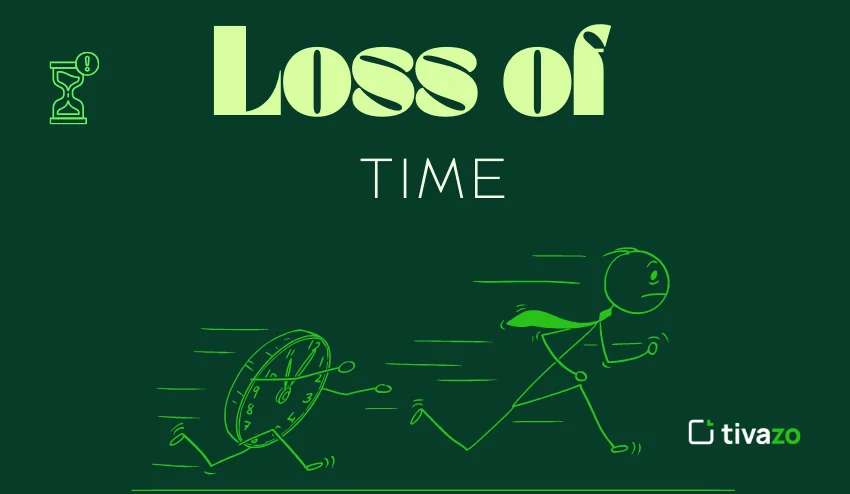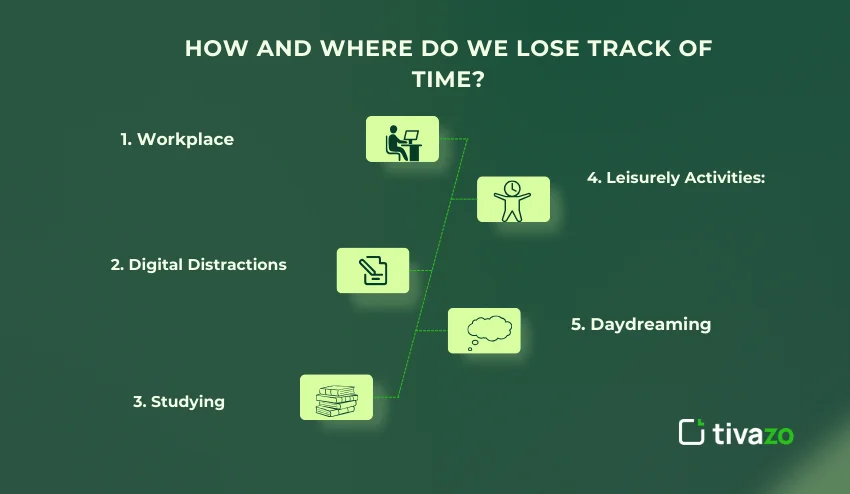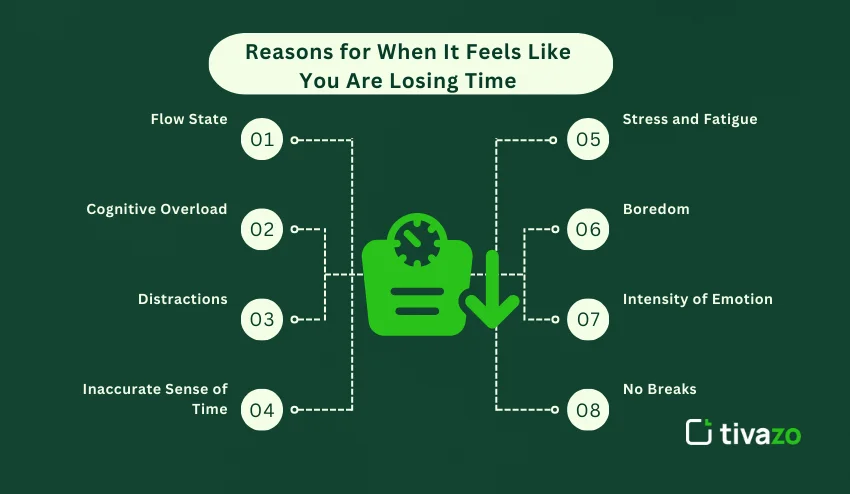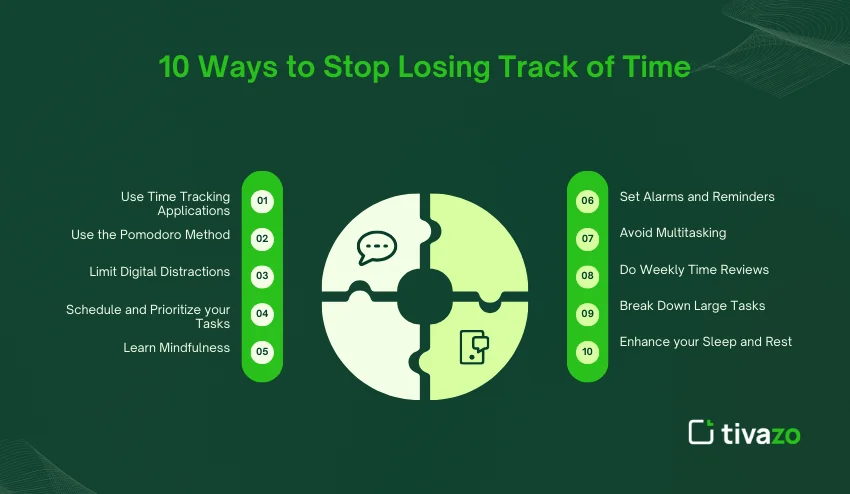Ever glanced at the clock and questioned where all the hours had disappeared to? Getting lost in time happens to all of us, whether it’s work, school, or even during fun activities. While sometimes it just means that you’ve entered a state of deep focus and “flow”, losing track of time a lot ends up causing you unnecessary stress, missed deadlines, and decreased productivity. The first step, however, is figuring out why you are losing track of time and finding practical ways to change that so you can regain control of your day, balance work with personal life, and do more without burning out.
This guide will explain what it really means to lose track of time, why it’s happening, where you are losing time the most, examples of how it can happen in real life, and, most importantly, steps to take to stop losing track of time and be in control.
What Does it Mean to Lose Track of Time?
To lose track of time means to become so involved in something, a distraction, or a thought that hours go unnoticed and slip away from you. It usually happens when people look at the clock, only to be shocked at how late it is. Losing track of time can have positive consequences (like if a hobby or pastime you love), but most of the time it has negative consequences in relation to work or daily routine.

Here is a closer look at what it means:
- State of Absorption: When you are so absorbed in one thing that all your attention is focused on a task or thought, your ability to be aware of time goes away.
- Flow Experience: Psychologists call this the flow experience. This happens when you get so caught up in work or a hobby, you lose sight of time and don’t even realize time is passing.
- Time Blindness: Time blindness is something that some people have, especially those who have Attention Deficit Hyperactivity Disorder (ADHD), which makes it even harder for them to perceive time during daily life productivity.
- Distraction Overload: When we have multitudes of distractions (sliding notifications, a ringing phone, emails, Twitter feeds, etc.) that all take away our ability to track time.
- Daydreaming or Mind Wandering: Even some forms of idleness can present as daydreaming or mind wandering, taking time away from us without our awareness.
- Workplace Pressure: In the workplace, high-pressure meetings, work meetings, or multitasking could all extend periods of time beyond our immediate capabilities.
- Facilitated by Emotional State: Specific emotional states, such as excitement, exhaustion, or stress, can distort the way we experience time in terms of its passage.
- Routine Activities: Actions like commuting, preparing food, or scrolling can all be routine and make time difficult to recognize.
In brief, you’re losing track of time when your awareness departs from the clock, due to being engrossed, distracted, or in a mood state.
How and Where Do We Lose Track of Time?
You can lose track of time in many environments:
- Workplace: Sometimes you have prolonged meetings, receive endless emails, or multitask so much that you can’t fathom that there were hours consumed.
- Digital Distractions: Scrolling through social media accounts, online shopping, and gaming, you lose time quickly when you least expect it.
- Studying: You might be studying a subject very well, and hours have gone by, but you have no awareness leading up to your deadlines.
- Leisurely Activities: Talking with friends, exercising, and reading.
- Daydreaming: Allowing your mind to drift away from what is important.

Scenario: How Time is Lost
| Scenario | How Time is Lost |
| Social Media | Scrolling an Unending algorithm feed contributes to dopamine cycles |
| Multitasking at Work | Constant task-switching reduces awareness |
| Long (or never-ending) Meetings | No agenda or boundaries allow for overrunning |
| Gaming / Streaming | Just one more” cycle consumes hours |
| Daydreaming | Physically doing one task; mentally have lost sight of at least one other task |
Modern-day distractions, especially digital distractions, and schedules that are poorly managed, tend to be the most common areas where we are losing track of time. For example, scrolling on Instagram almost always leads to 45 minutes of what started as a 5-minute check due to infinite scroll and autoplay features. Likewise, employees often lose track of time in long meetings where there are no agendas, discussions, or boundaries to keep from overrunning.
This situation is also one we share with students, where, once they become immersed in the work or study situation and forget to keep basic awareness of a deadline, we losing track of time. Even leisure activities such as reading, talking with friends, studying, and gaming can have us lose track of our time.
Real-Life Examples of Losing Track of Time
Office Worker
Employee opens their computer at 9 AM to check emails, and does not realize when they look up that it is now noon and they have not accomplished any type of task. In this example, they have lost track of time, which makes them stressed and scrambling to complete their work.
Student
The student thinks they will have a quick break, pulls up TikTok, and does not realize they have been scrolling for two hours. Now the student is behind in their deadlines and study goals.
Parent
The parent is cooking dinner while talking on the phone. The conversation stretches, and when the parent realizes dinner is delayed, so is the hour for the family to eat, changing everyone else’s dinner schedules.
Freelancer
A freelancer is working hard on a deeply thought-out design for a new project, and forgets deadlines for all their other clients.
Virtual Meetings
Many professionals today spend hours on virtual meetings and do not give themselves enough time in their schedules to accomplish actual work.
Research/ Study
When students participate in their research or studying, at times they become so absorbed that they realize hours have gone by.
Examples of Positive Flow
Artists, writers, or others who spend a lot of time on a hobby can experience time flying by, which is considered a “flow” state. A deep flow state can enhance creativity, but if you still neglect certain responsibilities in your daily work and home life, it is important to manage and recall that five hours went by very quickly.
Reasons for When It Feels Like You Are Losing Time
There are psychological and practical reasons why losing track of time happens so often:
- Flow State: When you are doing meaningful or enjoyable work, it can be incredibly easy to lose awareness of the clock. While being in this flow state can enhance creativity and productivity, it also makes hours fly by without you noticing.
- Cognitive Overload: When you are trying to juggle too many things, your brain becomes overwhelmed with too much information, and your brain loses track of how much time has elapsed. The more you multitask, the more likely this will happen.
- Distractions: Social media, notifications, ambient noise, or anything else that pulls your attention away from what you are trying to do can cause you to losing track of time.
- Inaccurate Sense of Time: Without an itinerary or schedule, or any form of plan, it is easy to underestimate the time to complete a task, thus causing you to experience unexpected delays.
- Stress and Fatigue: When you are mentally or physically fatigued, you have diminished capacity to fathom or monitor how your time is being spent, which can create “time blindness,” so an hour or more can go by and you don’t even realize it.
- Boredom: Repetitive or unengaging tasks can skew your sense of time, so you might feel that time is passing either slower or faster than usual.
- Intensity of Emotion: Heightened emotional states, whether they are excitement, anxiety, or just general frustration, can also distort your sense of how quickly time passes.
- No Breaks: If you are simply continuing to work with little pause or break, it is easy to lose track of time or misjudge how long you have been working. Continuing to work for long periods can negatively influence and distort your perception of time.
Knowing these reasons can be effective in identifying triggers and putting systems in place to regain control over losing track of time.

10 Ways to Stop Losing Track of Time
Here are valid and tested ways to stop losing track of time and increase productivity:
1. Use Time Tracking Applications
Applications such as Apploye, Toggl, or Clockify are a few sample apps that track what you are spending your hours on. You can see valuable reports where you can easily figure out what activities are wasting a good portion of your time, so that you can take some action. Time tracking is beneficial to decreasing the loss of track of time because you are aware of how every minute of your time is being spent.
2. Use the Pomodoro Method
Work in concentrated 25-minute intervals with 5-minute breaks. Imagine having a framework to prevent time from slipping away, while being more concentrated and energized in your work. The Pomodoro method is particularly reliable for people who tend to lose track of time because they are immersed in deep work.
3. Limit Digital Distractions
Turn off notifications, access distracting websites, and limit the number of apps you can use. When you minimise digital noise, it gives your mind a distraction-free anchor to concentrate on and prevents your mind from disappearing for hours at a time.
4. Schedule and Prioritize your Tasks
Use a paper or digital planner with start and end times. When you prioritize tasks, this will prevent losing track of time by ensuring that you get important work completed first.
5. Learn Mindfulness
Mindful breathing or a quick pause to reflect will help you stay aware of your time. The more conscious you are, the less chances that you will have of losing track of time!
6. Set Alarms and Reminders
Alarms tell you when to switch tasks or take a break, keeping you aware of the time. This is an effective way to combat the challenge of becoming unaware of the task-oriented time and losing track of time.
7. Avoid Multitasking
Always be single-tasking. Multitasking expands time loss because it makes it easier to losing track of time while feeling busy and misdirected efforts.
8. Do Weekly Time Reviews
Take time at the end of each week to review, including where and how you lost time. Being aware of the low points where you lost time will help you develop new patterns in the future.
9. Break Down Large Tasks
When you have a large project or project, break it down into smaller steps. This way, you stay on track with your schedule, and procrastination time won’t lead you to unwanted losing track of time.
10. Enhance your Sleep and Rest
Research has shown that a ‘rested’ brain is much more aware of the passing of time, so you won’t ‘lose’ time related to fatigue. Sleep is essential for focus and, therefore ridge helps reduce time and space blindness.
Using these techniques consistently will allow you to develop strong guidance of your own schedule, reduce distractions, develop more normal time connectedness, and stop losing track of time and control, whether workplace or study/or personal life.

Conclusion
Time slips away from us all far too easily, causing issues with productivity, focus, and daily living. Whether it is caused by distractions, multitasking, cognitive overload, or being lost in something, it happens. The key to regaining your grip over time is identifying why and where you are losing track of time. In this guide, we will illustrate some tangible examples, share psychological reasoning, and finally, provide you with 10 effective ways to stop it, from time tracking apps, the Pomodoro method, Mindfulness, and sleep improvement. These tips can help you focus, manage your work hours, and give you back control of your day.




